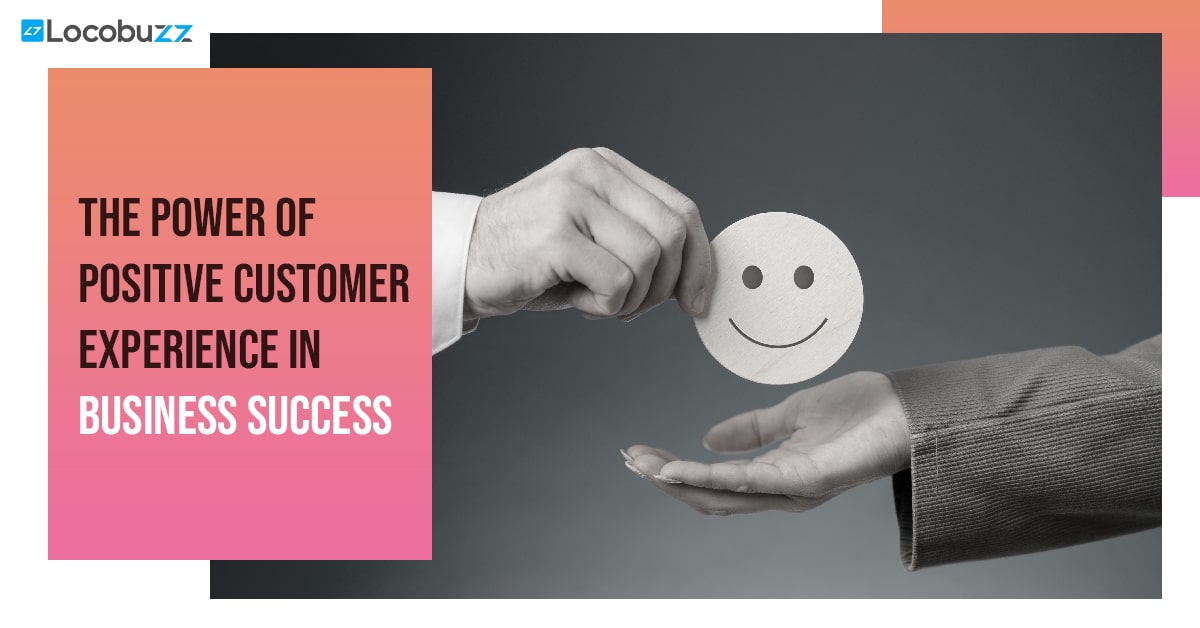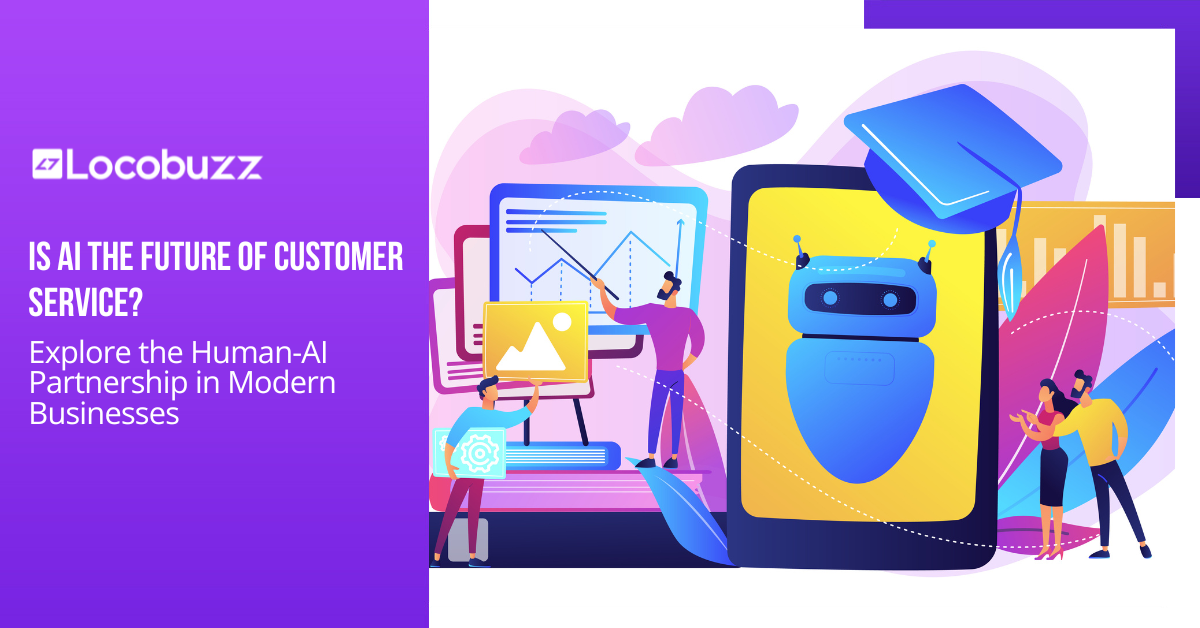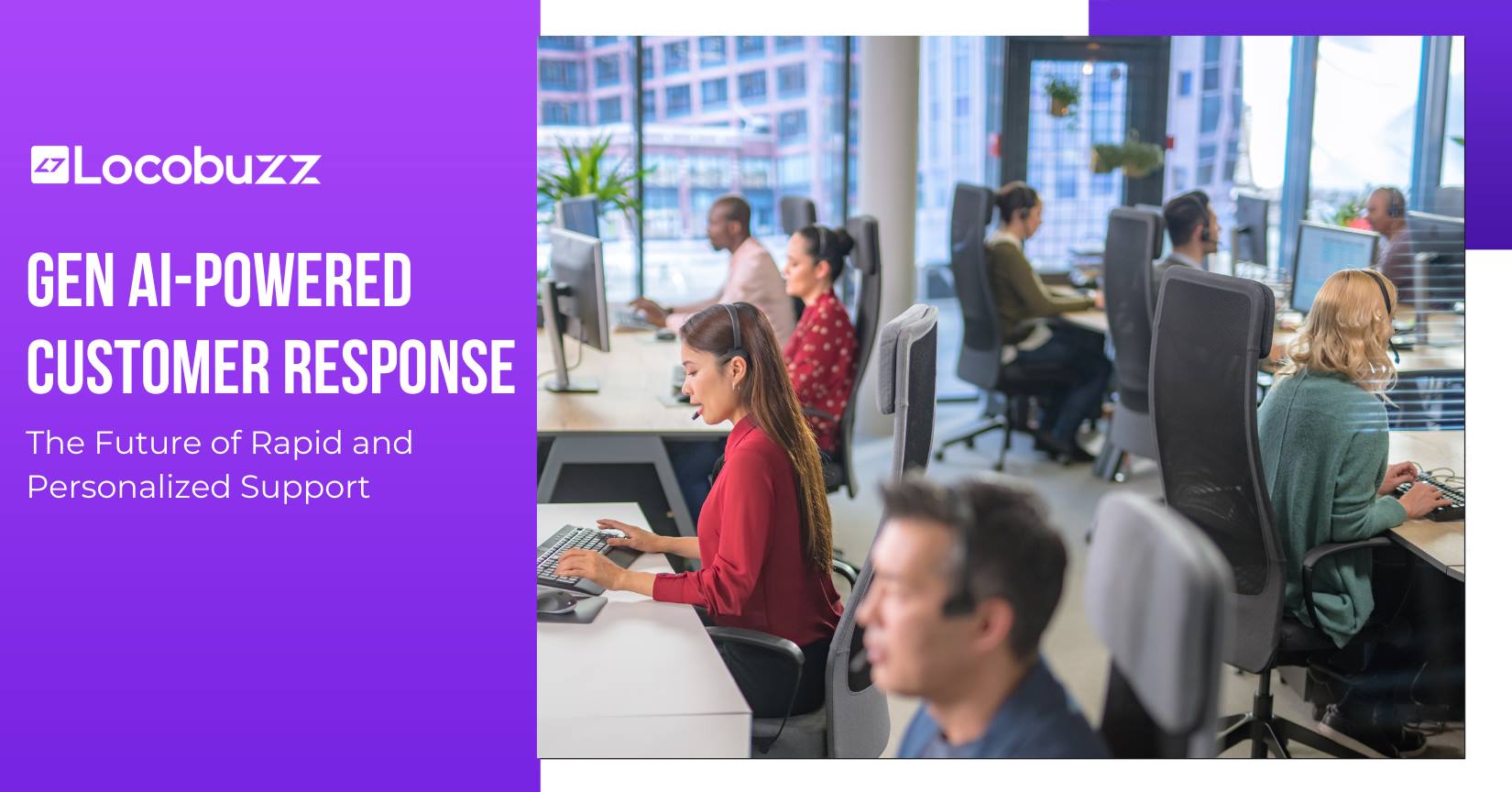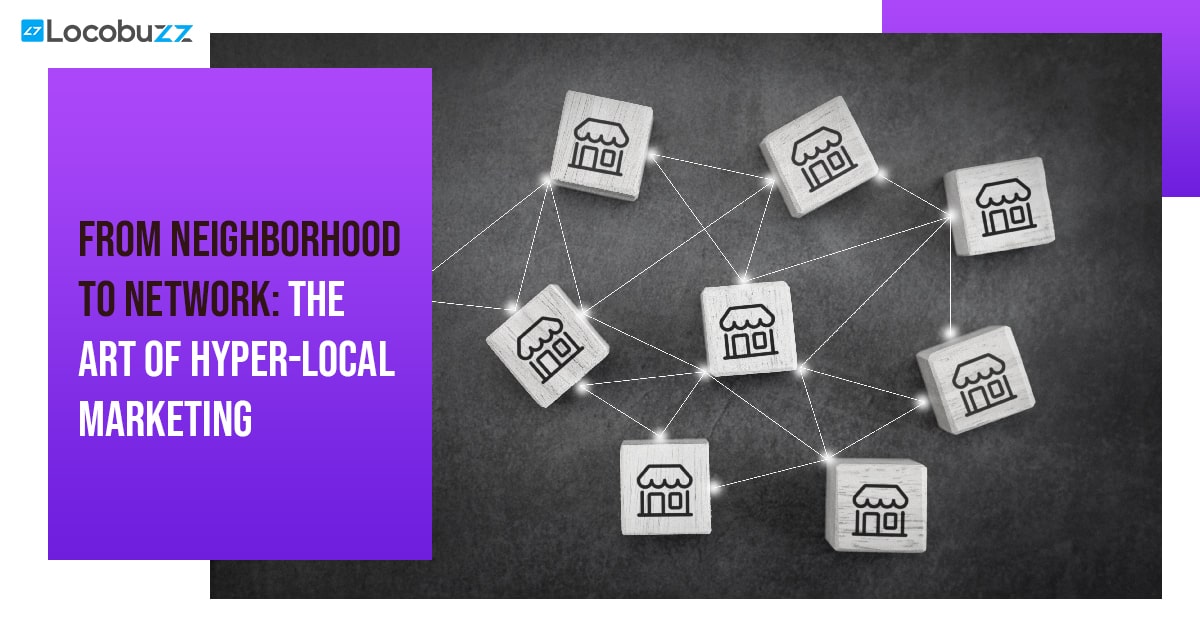The Power of Positive Customer Experience in Business Success
 As businesses continue to compete for customers, it has become increasingly clear that customer experience (CX) is the key to success. In today’s world, customers are looking for more than just good products or services – they want to feel valued, understood, and appreciated.
As businesses continue to compete for customers, it has become increasingly clear that customer experience (CX) is the key to success. In today’s world, customers are looking for more than just good products or services – they want to feel valued, understood, and appreciated.
At Locobuzz, we understand the importance of CX and have built a unified customer experience platform that converges technologies like Artificial Intelligence, Machine Learning, Big Data, and Analytics to help brands create long-lasting relationships with their customers and increase their lifetime value. Our platform offers various functions, including Marketing, Customer Experience, CRM, and Analytics, all on a single unified platform, eliminating siloes around tools and data and unlocking immense value while improving collaboration across teams.
Table of Contents
Customer Experience: The Definition
Why Is Customer Experience Important?
The importance of customer experience cannot be overstated.
In a crowded market, customer experience can be the factor that sets your brand apart. Customers are more likely to remain loyal to a brand that offers a consistently positive experience.
Customers who have a positive experience with a brand are more likely to continue doing business with it and even become brand advocates, increasing the customer lifetime value.
A great customer experience leads to positive word-of-mouth marketing and enhances your brand reputation, attracting new customers and retaining existing ones.
Happy customers are more likely to leave positive reviews, recommend your brand to others, and even spend more money with you, ultimately leading to better business performance.
What will Customer Experience measure
Customer experience (CX) measurement is the process of quantitatively and qualitatively assessing how customers perceive their interactions with a company across all touchpoints throughout the customer journey. It aims to provide insights into how customers perceive a brand, its products, and its services, and how well the brand is meeting their expectations and needs.
CX measurement can include various metrics, such as Net Promoter Score (NPS), Customer Satisfaction Score (CSAT), Customer Effort Score (CES), and others. These metrics help companies gauge how well they are delivering on their promises, and identify areas that need improvement.
In addition to metrics, companies can also use qualitative feedback, such as customer reviews, social media comments, and surveys, to gain a deeper understanding of customers’ experiences and sentiment towards the brand.
The ultimate goal of CX measurement is to create a better customer experience by identifying areas of improvement and implementing changes that enhance the overall experience. By continuously measuring and improving CX, companies can increase customer loyalty, improve retention rates, and ultimately drive revenue growth.
Why does Customer Experience matter?
Customer experience matters for several reasons.
When customers have a positive experience with a business, they are more likely to become repeat customers and recommend the business to others. This can help businesses build a loyal customer base and increase revenue.
A positive customer experience can help build a good reputation for the brand. This can help businesses attract new customers and retain existing ones.
In today’s competitive market, businesses need to differentiate themselves from their competitors. Offering a superior customer experience can be a key differentiator and give businesses a competitive advantage.
When customers have a positive experience, they are more likely to make additional purchases and spend more money. This can result in increased revenue for businesses. A positive customer experience can also help businesses save money. It is less expensive to retain existing customers than to acquire new ones. Additionally, satisfied customers are less likely to require customer support, which can reduce support costs for businesses.
Why is a positive customer experience essential?
A positive customer experience can create a loyal customer base, leading to repeat business and increased revenue.
Company’s brand reputation can attract new customers and retain existing ones.
Business can lead to a great word-of-mouth advertising, which can be a powerful marketing tool.
In today’s competitive market, a positive customer experience can differentiate a business from its competitors and help it stand out.
It definitely helps in reducing costs associated with customer acquisition, customer support, and product returns, as satisfied customers are less likely to require these services. But at the end its essential for the long-term success and growth of a business
How customer Experience will improve ORM
Online Reputation Management (ORM) refers to the practice of monitoring, influencing, and improving an individual or organization’s online reputation. A crucial factor in building and maintaining a positive online reputation is the customer experience.
When a customer has a positive experience with a brand, they are more likely to share that experience with others, leave positive reviews, and recommend the brand to friends and family. On the other hand, if a customer has a negative experience, they may leave negative reviews, share their experience on social media, and discourage others from doing business with the brand.
By focusing on improving customer experience, brands can enhance their online reputation and increase positive interactions with customers
When customers have a positive experience with a brand, they are more likely to leave positive reviews on review websites and social media platforms. This can help increase the brand’s overall rating and improve their online reputation.
Social media is a powerful tool for building relationships with customers. By engaging with customers on social media and responding to their comments and concerns, brands can improve their reputation and show that they care about their customers.
Positive word-of-mouth can be incredibly powerful in building a brand’s reputation. By providing exceptional customer experiences, brands can turn customers into brand advocates who share their positive experiences with others.
When a brand experiences a crisis or negative publicity, having a strong foundation of positive customer experiences can help mitigate the damage. By having a loyal customer base that trusts and supports the brand, the impact of a crisis can be minimized.
Need of Customer Experience in 2023
As we move into 2023, the business landscape is becoming increasingly competitive, and customer expectations are higher than ever before. In this environment, delivering exceptional customer experience (CX) has become a necessity for businesses of all sizes and industries.
With so many options available to consumers, delivering a superior customer experience can be the key to standing out from competitors. A memorable and positive experience can be a powerful way to differentiate your brand and create loyal customers.
A great customer experience can lead to increased customer loyalty, repeat business, and positive word-of-mouth recommendations. This can ultimately result in increased revenue and profits for your business.
Businesses can provide a seamless and efficient customer experience and can also help businesses save costs by reducing customer churn, improving customer retention, and decreasing support and service costs.
Insights and Data: Collecting customer feedback and data through customer experience initiatives can provide valuable insights into customer behavior, preferences, and pain points. This data can be used to optimize products, services, and marketing strategies.
Delivering exceptional customer experience can also positively impact your brand reputation. Happy customers are more likely to leave positive reviews and recommend your business to others, leading to improved online reputation management (ORM).
How can businesses enhance the customer experience?
Businesses can enhance the customer experience in several ways. Businesses should create a customer-centric culture where every employee is focused on meeting the needs of the customer.
Providing personalized experiences by using customer data to understand their preferences and behavior. Businesses should adopt an omni-channel approach where customers can interact with the brand through various channels such as social media, email, phone, and in-store. Empowering employees to make decisions and take action to solve customer problems.
Businesses should respond to customer inquiries and complaints in a timely manner, preferably within 24 hours. Providing various feedback mechanisms for customers to share their experience and suggestions for improvement.
Regularly evaluating the customer experience and making necessary improvements based on feedback and data analysis. Providing training to employees on customer service, empathy, and problem-solving skills.
Utilizing technology such as chatbots, AI, and machine learning to provide quick and efficient solutions to customer queries and issues.
Businesses that must use Customer Experience Platforms
Any business that interacts with customers can benefit from using customer experience (CX) platforms. Some examples of businesses that can benefit from CX platforms are:
E-commerce websites: Online retailers need to provide an excellent customer experience to attract and retain customers.
Service-based businesses: Businesses that provide services such as financial, healthcare, or consulting need to provide a personalized and efficient customer experience.
Hospitality and travel industry: Hotels, airlines, and other travel companies need to provide a seamless customer experience to ensure customer satisfaction and loyalty.
Retail stores: Retail stores need to provide an in-store customer experience that is engaging, personalized, and convenient.
Telecom and internet service providers: Telecom and internet service providers need to provide a reliable and efficient customer experience to retain customers.
Banking and financial institutions: Banks and financial institutions need to provide an easy and secure customer experience to build trust and retain customers.
Software and technology companies: Software and technology companies need to provide a customer experience that is user-friendly, efficient, and reliable.
In general, any business that values customer satisfaction and loyalty can benefit from using customer experience platforms to improve their customer experience.
The Elements of a Great Customer Experience
When it comes to customer experience, there are many elements that contribute to creating a great one. In today’s world, where customers have many options to choose from, it’s crucial to make sure your brand stands out from the competition. Here are some of the key elements that make up a great customer experience:
Customers want to feel valued and recognized as individuals. Personalization can be achieved through various means, such as targeted messaging, customized recommendations, and personalized experiences.
Customers expect a seamless experience across all channels and touchpoints. This means providing a consistent experience across all platforms, from social media to your website to your physical store.
When customers encounter an issue, they want prompt and effective support to resolve it. This means having a responsive and helpful customer support team, as well as easy-to-use self-service options.
Customers want to feel understood and heard. This means actively listening to customer feedback and taking action to address their concerns and needs.
Customers value transparency and honesty. This means being upfront about your products and services, as well as any issues that may arise.
Customers appreciate when brands anticipate their needs and provide solutions before they even ask. This can be achieved through personalized recommendations, proactive communication, and predictive analytics.
They want to feel connected to a brand that they can trust. This means having a consistent branding message across all channels and touchpoints, including social media, advertising, and customer service.
How to Create a Great Customer Experience
Creating a great customer experience requires a holistic approach that considers every aspect of the customer journey. Here are a few steps you can take:
To create a positive experience, you need to understand your customers’ needs, preferences, and pain points. Use customer feedback and data to gain insights into your audience and tailor your offerings accordingly.
Consistency is key when it comes to customer experience. Ensure that every touchpoint with your brand is consistent, whether it’s your website, social media presence, or customer service.
Technology can help you automate processes, personalize customer experiences, and offer real-time support. Leverage tools like Locobuzz to streamline your customer experience efforts.
Employees are on the front lines of customer experience, so it’s essential to empower them to deliver exceptional service. Offer training, support, and incentives to motivate and engage them
How Customer Experience Works
Customer experience is the cumulative result of every interaction that a customer has with a brand. It encompasses the entire customer journey, from the moment they first become aware of a brand, to the point where they become a loyal customer or brand ambassador.
Customer experience is affected by many factors, including the quality of customer service, the ease of use of a product or service, the pricing, the overall brand reputation, and the emotional connection that a customer feels with the brand.
To create a great customer experience, companies need to focus on every touchpoint that a customer has with their brand. This includes their website, social media channels, advertising, customer service interactions, product packaging, and more.
One important aspect of customer experience is personalization. By understanding their customers’ needs and preferences, companies can tailor their products and services to provide a more personalized experience that meets the individual needs of each customer. This can include personalized recommendations, customized product offerings, and personalized customer service interactions.
Another key element of customer experience is feedback. By actively seeking feedback from customers and incorporating it into their processes and decision-making, companies can continuously improve their customer experience and stay ahead of the competition.
Customer experience is the sum of all interactions a customer has with a brand, and creating a great customer experience involves focusing on every touchpoint, personalizing the experience, and incorporating customer feedback to continuously improve.
Customer Experience Management
Customer Experience Management (CEM) is the practice of designing, measuring, and improving customer interactions and experiences with a brand. It encompasses all aspects of a customer’s journey, including awareness, engagement, purchase, support, and advocacy.
The ultimate goal of CX management is to create long-lasting and positive relationships between customers and the brand.
The importance of CX management cannot be overstated. Customers today have more choices than ever before and are increasingly likely to switch to a competitor if they encounter poor customer experiences.
According to a study on customer service statistics after just one negative experience, more than half (61%) of the customers say they would move to a competitor; this number rises to 76% in the case of multiple negative experiences
To ensure that customer experiences are consistently positive, brands must adopt best practices for CX management. This includes creating a customer-centric culture that places the customer at the center of all decision-making processes.
All departments should be involved in CX management to ensure a seamless experience across all touchpoints. Finally, prioritizing customer feedback is essential for identifying pain points, addressing concerns, and improving overall satisfaction.
There are numerous tools and platforms available to help brands effectively manage their customer experiences.
These include customer feedback management tools, social media listening and engagement tools, customer journey mapping software, and analytics platforms.
Choosing the right tools and platforms for your organization will depend on your unique needs and budget.
CX management is a critical practice for any brand looking to succeed in today’s competitive marketplace.
By focusing on creating positive customer experiences, involving all departments, and utilizing effective tools and platforms, brands can build strong customer relationships and drive long-term growth.
The Future of Customer Experience
Artificial Intelligence (AI) and Machine Learning (ML)
Voice-Activated Interfaces
Augmented Reality (AR) and Virtual Reality (VR)
Personalization
Customer Data Management
As businesses collect more data on their customers, managing that data will become increasingly important. In the future, we can expect businesses to invest more in data management and analytics tools that enable them to make better use of customer data. This could include predictive analytics tools that help businesses anticipate customer needs and preferences, or customer data platforms that enable businesses to centralize their customer data and create a single view of the customer.
The future of CX is set to be more innovative and personalized than ever before. By embracing emerging technologies like AI, voice-activated interfaces, AR, and VR, and investing in customer data management and analytics tools, businesses can stay ahead of the curve and provide exceptional customer experiences that drive loyalty and growth.
Locobuzz as a great tool for a complete Customer Experience platform
Now Achieve Excellence with Locobuzz #CXSuite as it is indeed a comprehensive Customer Experience platform that offers a range of tools and features to help businesses deliver exceptional customer experiences.
Multichannel Listening and Engagement is possible as it allows businesses to monitor customer conversations across multiple channels, including social media, email, chat, and more. This helps businesses to stay on top of customer needs and respond to queries and concerns quickly.
Real-time Sentiment Analysis can be done with ease. Locobuzz’s AI-powered sentiment analysis allows businesses to understand the emotions and attitudes of customers in real-time. This helps businesses to identify potential issues and take proactive measures to address them.
The ticketing system helps businesses to streamline customer service operations and manage customer queries and issues more efficiently. The platform also offers advanced workflow management tools that enable businesses to automate repetitive tasks and focus on high-priority issues.
Locobuzz provides businesses with in-depth analytics and insights into customer behavior, preferences, and trends. This helps businesses to make data-driven decisions and improve the overall customer experience.
Collaboration and Integration: Locobuzz integrates with a range of popular tools and platforms, such as CRM systems, helpdesk software, and marketing automation tools. This allows businesses to streamline their workflows and collaborate more effectively across teams.
Overall, Locobuzz is an excellent tool for businesses looking to enhance their customer experience and build long-lasting relationships with their customers. With its advanced features and capabilities, the platform can help businesses stay ahead of the competition and deliver exceptional customer service at every touchpoint.
Final Thoughts
In today’s world, customer experience is critical to business success. By prioritizing customer experience and using tools like Locobuzz, brands can create positive experiences that foster long-lasting relationships with their customers, differentiate themselves from the competition, and drive business growth. So, make sure to take customer experience seriously and see the difference it can make!






















